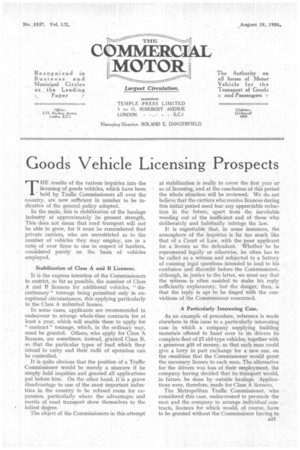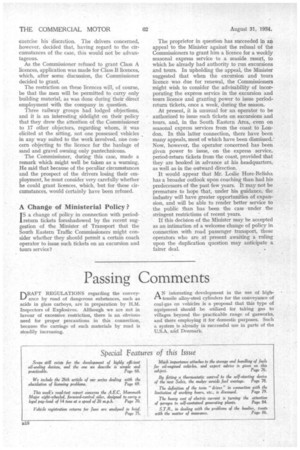Goods Vehicle Licensing Prospects
Page 27

Page 28

If you've noticed an error in this article please click here to report it so we can fix it.
T' HE results of the various inquiries into the licensing of goods vehicles, which have been held by Traffic Commissioners all over the country, are now sufficient in number to be indicative of the general policy adopted.
In the main, this is stabilization of the haulage industry at approximately its present strength. This does not mean that road transport will not be able to grow, for it must be remembered that private carriers, who are unrestricted as to the number of vehicles they may employ, are in •a ratic, of over three to one in respect of hauliers, considered purely on the basis of vehicles employed.
Stabilization of Class A and B Licences.
It is the express intention of the Commissioners to restrict, so far as possible, the number of Class A and 13 licences for additional vehicles, " discretionary " tonnage being permitted only in exceptional circumstances, this applying particularly to the Class A unlimited licence.
In some cases, applicants are recommended to endeavour to arrange whole-time contracts for at least a year, which will enable them to apply for " contract" tonnage, which, in the ordinary way, must be granted. Others, who apply for Class A lic,ences, are sometimes, instead, granted Class B, so that the particular types of load which they intend to carry and their radii of operation can be controlled.
It is quite obvious that the position of a Traffic Commissioner would be merely a sinecure if he simply held inquiries and granted all applications put before him. On the other hand, it is a grave disadvantage to one of the most important industries in the country to be refused room for expansion, particularly where the advantages and merits of road transport show themselves to the • fullest degree.
The Object of the Commissioners in this attempt at stabilization is really to cover the first year or so of licensing, and at the conclusion of this period the whole situation will be reviewed. We do not believe that the carriers who receive licences during this initial period need fear any appreciable reduction in the future, apart from the inevitable weeding out of the inefficient and of those who deliberately and habitually infringe the law.
It is regrettable that, in some instances, the atmosphere of the inquiries is far too much like that of a Court of Law, with the poor applicant for a licence as the defendant. Whether he be represented legally or otherwise, he often has to be called as a witness and subjected to a battery of cunning legal questions intended to lead to his confusion and discredit before the Cornmissioner, although, in justice to the latter, we must say that the witness is often assisted to make his reply sufficiently explanatory, but the danger, then, is that the reply is apt to be tinged with the convictions of the Commissioner concerned.
A Particularly Interesting Case.
As an example of procedure, reference is made elsewhere in this issue to a particularly interesting case in which a company supplying building materials offered to hand over to its drivers its complete fleet of 27 old-type vehicles, together with a generous gift of money, so that each man could give a lorry in part exchange for a new one, on the condition that the Commissioner would grant the necessary licence to each man. The alternative for the drivers was loss of their employment, the company having decided that its transport would, in future, be done by outside haulage. Applications were, therefore, made for Class A licences.
The Metropolitan Traffic Commissioner, who considered this case, endeavoured to persuade the men and the company to arrange individual con-. tracts, licences for which would, of course, have to begranted without the Commissioner having to exercise his discretion. The drivers concerned, however, decided that, having regard to the circumstances of the case, this would not be advantageous.
As the Commissioner refused to grant Class A licences, application was made for Class B licences, which, after some discussion, the Commissioner decided to grant.
The restriction on these licences will, of course, be that the men will be permitted to carry only building material, as was done during their direct employment with the company in question.
Three railway groups had lodged objections, and it is an interesting, sidelight on their policy that they drew the attention of the Commissioner to 17 other objectors, regarding whom, it was elicited at the sitting, not one possessed, vehicles in any way suited to the work involved, one concern objecting to the licence for the haulage of sand and gravel owning only pantechnicons.
The Commissioner, during this case, made a remark which might well be taken as a warning. He said that because of the peculiar circumstances and the prospect of the drivers losing their employment, he must consider very carefully whether he could grant licences, which, but for these circumstances, would certainly have been refused.
A Change of Ministerial Policy ?
I S a change of policy in connection with period return tickets foreshadowed by the recent suggestion of the Minister of Transport that the South Eastern Traffic Commissioners might consider whether they should permit a certain coach operator to issue such tickets on an excursion and tours service? The proprietor in question has succeeded in an appeal to the Minister against the refusal of the Commissioners to grant him a licence for a weekly seasonal express service to a seaside resort, to which he already had authority to run excursions and tours. In upholding the appeal, the Minister suggested that when the excursion and tours licence was due for renewal, the Commissioners might wish to consider the advisability of incorporating the express service in the excursion and tours licence and granting power to issue periodreturn tickets, once a week, during the season.
At present, it is unusual for an operator to be authorized to issue such tickets on excursions and tours, and, in the South Eastern Area, even on seasonal express services from the coast to London. In this latter Connection, there have been many appeals, most of which have been dismissed: Now, however, the operator concerned has been given power to issue, on the express service, period-return tickets from the coast, provided that they are booked in advance at his headquarters, as well as in the outward direction.
It would appear that Mr. Leslie Hore-Belisha has a broader outlook upon coaching than had his predecessors of the past few years. It may not be premature to hope that, under his guidance, the industry will have greater opportunities of expansion, and will be able to render better service to the public than has been the case under the stringent restrictions of recent years.
If this decision of the Minister may be accepted as an intimation of a welcome change of policy in connection with road passenger transport, those operators who are at present awaiting a ruling upon the duplication question may anticipate a fairer deal.




















































































